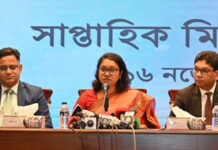The failure of higher education

What can we do to improve our position?
There are 104 private universities in our country with a huge number of students, with their own curricula. But they raise two questions: Do they provide same quality of education as public universities? And does the University Grant Commission (UGC) have control over these universities to ensure the quality of education?
If any student wants to enrol in any highly recognized BBA program, he or she has to expend Tk10 lakh to 12 lakh for his tuition on top of other expenses they might have.
On another front, it is a matter of concern to everybody that, in last several years, from primary PSC exams to the highest BCS, question papers have been leaked. And it is our failure that we couldn’t stop to these leaks.
As such, of course, the merit of the students of this period couldn’t be evaluated properly. When they finally join their respective job sectors, what will be the ultimate result?
For example, if a student is admitted into a medical school with the help of a leaked question paper, and then he or she goes on to become a doctor, what will be the future of our health sector? How disastrous would that be?
The government has to take the responsibility on this issue. And everywhere in the sector, it’s utter chaos.
Private learning
According to the Ministry of Education and UGC, there are 95 active private universities with 354,333 students and 16,020 teachers. More interestingly, in these universities, 20 don’t have a VC, 72 are running without any pro-VC, and in 53, the post of treasurer is vacant.
Furthermore, only 20 universities are running according to the rules of the UGC and the Ministry of Education. God knows in what state the other universities are functioning.
Most of these private universities are owned and directed by pro-government politicians and teachers. Many of them are now in power, while others are ex-politicians.
Some of these universities are run by businessmen who have political connections. In some universities, the board of trustees is made up of family members.
In 2014, Transparency International Bangladesh (TIB) found that the one-third of the universities were owned by businessmen. Almost one-fifth were directed by politicians or politically connected people.
As these universities are run by such figures, it is hard to keep them under control. The ex-chairman of UGC, Professor Abdul Mannan said: “The UGC just can make suggestions to the Ministry of Education and the case goes on year after year.”
In 2010, a new law was formed, which stated that private universities must be supervised by the UGC. However, in this law, any particular qualification for a board trustee isn’t mentioned.
As a result, when a businessman or a political leader gets approval, he or she can take huge sums of money from students for their own profit.
According to the World Economics Forum, in the scale of higher education quality, Bangladesh is the lowest among the South Asian countries.
Among 136 countries of the world, Bangladesh is ranked 84th. India is on 29th, Sri Lanka on 40th, Pakistan on 71st, and Nepal on 77th. We can understand how dire the situation is.
We need a better plan when it comes to private universities, how they will function, and how they can benefit the rest of the country (half of them are in Dhaka). If we can’t cut through the failure of our higher education sector, we as a nation will not be able to stand upright.
Benoy Dutta is an author and journalist. This article was translated from Bangla by Mohammad Al Bahlul.









